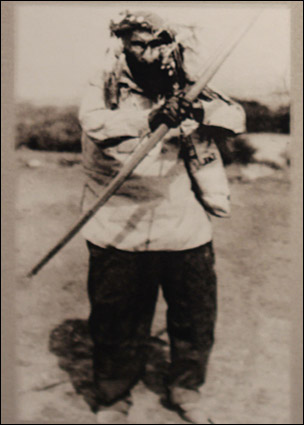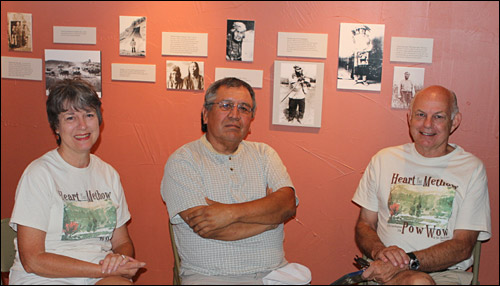home | internet service | web design | business directory | bulletin board | advertise | events calendar | contact | weather | cams

|
 Seolum-Son of Ole Josaphine, Spencer Martin's great-grandfather, who according to the family story survived a grizzly bear attack up the Rendezvous and had the scars to show for it. Seolum, who was a scout for a crew looking for a train route across the North Cascades, also was a spiritual guide to his people. Seolum-Son of Ole Josaphine, Spencer Martin's great-grandfather, who according to the family story survived a grizzly bear attack up the Rendezvous and had the scars to show for it. Seolum, who was a scout for a crew looking for a train route across the North Cascades, also was a spiritual guide to his people.This weekend’s three-day "Heart of the Methow Powwow" is the 10th anniversary of a public celebration that started with a private journey of reconciliation between the Native- and Anglo-Americans who claim the Methow Valley as their home. The story of that journey is told only briefly here, but is more fully chronicled in "Two Rivers," an award-winning documentary film by Rodney Mitchell that was released in 2007. The film has been shown nationally and internationally to help other communities start reconciliation projects and is being used in college classes across the country, according to Glenn Schmekel, the Twisp man who with his wife, Carolyn, decided to find out what happened to the Methow Indians. The schedule Saturday events begin at 10 a.m. with one of two naming ceremonies planned by the Miller family. Louie Miller is the last member of the Methow Band living in the Methow Valley. His allotment is near Pateros. A number of family members, including his sister, Mary Marchand, are expected to attend. A shared meal will be served buffet style at noon Saturday with salmon provided by the Colville Confederated Tribes. Cultural and educational activities are planned from 1-5 p.m. A second Miller family naming ceremony is scheduled for 4 p.m. Inter-tribal dancing starts at 7 p.m. Everyone in attendance is encouraged to join in. The powwow concludes Sunday with a sharing circle between 10 a.m. and noon. All events are free, including Saturday's meal, although contributions to the on-site donation bucket will be appreciated, according to the organizers. Throughout the weekend vendors will have traditional food available for purchase. T-shirts and crafts will be on sale. There also will be a raffle of two original paintings, "Spirit Horses" and "Brothers," by Grover Topaum, a Kiowa artist. The story The answer to the second question led Schmekel to found The Cove food bank in Twisp, which has grown into an umbrella organization meeting multiple needs in addition to the weekly distribution of food.  Carolyn Schmekel, Spencer Martin and Glenn Schmekel, left to right, at the new Methow Valley Interpretive Center in Twisp. All three are part of an ongoing discussion group as well as founders of the annual "Heart of the Methow" powwow. Carolyn Schmekel, Spencer Martin and Glenn Schmekel, left to right, at the new Methow Valley Interpretive Center in Twisp. All three are part of an ongoing discussion group as well as founders of the annual "Heart of the Methow" powwow.The answer to the first question is a continuing journey. Neither Schmekel knew any individual Indians or anything about the Methow Indians when they started. Did they still exist? What was their history in the Methow Valley? One day Carolyn received an email from a friend in Seattle who had been corresponding with John GrosVenor, a Native pastor living on the Colville Confederated Tribes reservation. Carolyn asked how to contact him. "We called John in Nespelem and he invited us over," Glenn said. "We spent three hours with John and his wife," added Carolyn. They told him they needed to meet more Indian people. And he connected them with Spencer Martin, of Omak, an Indian spiritual leader descended from Seolum-Son of Ole Josaphine. "We shared some of our vision with Spencer," said Glenn. As a consequence, Martin, the Schmekels, Ron and Cheryl Race and others started meeting regularly. The Indians talked; the whites listened, watched films and read history written from a Native American point of view. And they learned. "I had a fellow come up to me and say, 'There were no natives here. You're making up the story,' " Glenn said recently. But he knew better and kept reaching out and meeting people. “The first powwow was a way to do a formal reconciliation, in public,” Martin said last week. "We had been meeting for years talking about this. We knew what was in Glenn's heart... We got to the place where we felt we were ready to do the powwow." "We had the town totally behind us," Carolyn said of the first gathering in 2003. The Town of Twisp was the sponsor. Then-mayor Mike Price had been attending reconciliation meetings. Local mayors, town council members and spiritual leaders attended. Martin invited Indian people from the U.S. and Canada, and an annual event was born. "For several years, we had a traditional meal," Carolyn said. "The elders spoke during the meal as they felt they wanted to, but one of the cultural issues was that white people thought nothing was going on [during the long silences]." So in a nod to white culture, the meal at noon on Saturday is served buffet style. (About 300 people were served last year.) Ten years on, the powwow is widely known. Martin has been invited to Australia, among other spots beyond U.S. borders as well as closer to home, to tell the local Methow Valley story. "We had a dinner in Omak with the ministers," Martin said. "There's only a river that separates us, but people on their side of the river know nothing about the people on the other." To Glenn Schmekel, what happens in Twisp shows that "caring people can start and do something." The reconciliation group continues to meet four or five times a year in addition to gathering for the powwow, he added. "This is a key issue in our valley," said Carolyn. "If [Indian] people were comfortable here, they would be here. If they're not comfortable, they won't be here." Carolyn, with Glenn's help on remodeling, worked countless hours to get the Methow Valley Interpretive Center established earlier this summer in Twisp. The center, which will be open this weekend, includes a short film of sisters Elaine Timentwa Emerson and Tillie Timentwa Gorr, who are Methow Indians, telling part of their family story. Photographs, baskets and other artifacts used in traditional life are on display. Martin called the center "healing," especially for members of the Methow Band. The "Two Rivers" documentary is available at the center for $18. There also is a copy at the Twisp Library, and it can be ordered through Netflix. The Netflix liner notes describe the film as a story of people who allow "... the power of honesty and openness to heal old wounds. The result is a whole community richer than its parts." 8/14/2012 Comments
|